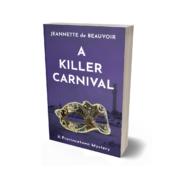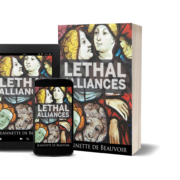See What Reviewers Are Saying

A Killer Carnival
“. . . By now, it should be evident that readers who choose A Killer Carnival are in for a rare treat. It’s an explosive (literally) combination of intrigue, suspense, and psychological insight set in an atmospheric, colorful locale that benefits from the author’s personal familiarity with P-town’s eccentrics and sometimes-questionable characters.
Packed with motive and heart-stopping moments and spiced by Sydney’s irreverent wit and sense of humor, A Killer Carnival is mystery writing at its finest. It’s especially recommended for prior readers, but is quite accessible to newcomers seeking superior stories, memorable characters, and fast-paced action. . . “
Click here for complete review.

Lethal Alliances
“. . . The richness of detail and authenticity of the times may be attributed to de Beauvoir’s background, but it truly takes a literary hand to capture these historical nuances in such a manner that the fictional side of the story remains completely engrossing even to those with no prior knowledge of or interest in French history.
Lethal Alliances crafts an engaging account that is as much about French politics of the times as it is about romance and intrigue. Winding these into the historical facts surrounding the political forces that clash with one another creates a moving, absorbing account which is educational, riveting, and hard to put down. . . “
Click here to read complete review.

A Book of Revelations
“. . . “We all lie when we’re cornered…. The irony isn’t lost on me. While I’ve made a career out of uncovering the truth in others, I’ve never faced my own” (222). About to write off the one he thought was the love of his life, the narrator in this longest tale of the collection (a novella also published separately) comes to terms with his own duality – and his capacity to give and receive love. In the first story, which reminds of The Lady in the Van, one neighbor’s drawn out secret allows the narrator’s abrupt coming out. In the second story, a musician’s admitted lack of ability with words gives way for a stunning moment: “the sacred, quiescent instant when each person in the audience reconciles the experience in his soul” (76). Two friends in the final tale get to the heart of one scoundrel’s suicide plot, as well as to the heart of their indelible friendship. The conceit of these stories is superb: A Book of Revelations isn’t so much about disclosure as the conflict surrounding it. . . . “

